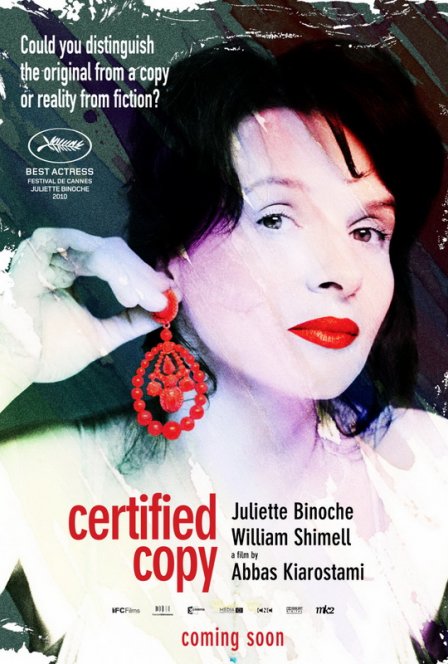While sitting through a screening of Certified Copy, the latest film from Abbas Kiarostami (Taste of Cherry), I was, at one point, tempted to groan aloud in response to a line of dialogue. The groan would have been less a ploy for attention than an involuntary response. I was in a physical state of discomfort that only a slight groan might have served to ameliorate. During one of their rambling, freshman thesis-level discussions on the nature of the reproduction vs. the original in art, British author James Miller (operatic baritone William Shimell) remarks sagely to a French expatriate and antiquarian known only as She (Juliette Binoche) that the Mona Lisa could be considered a copy because it is, in a sense, “a copy of the beauty of Lisa del Giocondo.” I was reluctant to release the groan, as I wasn’t sure that my fellow critics were all on the same page as I. In fact, the furious note-taking of one sitting to my right seemed to reach an impassioned crescendo during this line.
Perhaps if I had uttered the groan, and not saved it for later, I might have been thought by the others to have missed the point — yes, even a point as obvious as that. And this is the danger of writing a bad review of a film like Certified Copy: an attack on Kiarostami’s clumsy attempts to render intellectual-sounding discourse could be construed by some as an attack on intellectual inquiry itself. Fans of the films of Richard Linklater will delight in those roving dialogues that comprise the film’s first half. But, if they are, like Linklater, detractors of conventional dramatic structure, they may also feel slightly confused by the ostensive madness that ensues in the film’s second half — actually, a calculated madness that I will do my best to explain.
She and James are introduced to the viewer by means of a long lecture delivered by the latter — James preaches the value of the copy, which is, in a sense, kitsch value (it’s not an entirely original idea, but whatever) — of which She is a spectator. However, the actual content of the lecture is less important here because Kiarostami cleverly utilizes James’ silly pontifications as mere background noise for the introduction of She and her Son (Adrian Moore): an entirely mute exchange played out through paralinguistic cues. A short while later, She and James meet in her antique shop under highly uncomfortable circumstances, travel to the village of Lucignano (on a day when there seems to be an inordinate number of weddings going on), and embark on a long debate over aesthetics, one that the highly emotional She continually takes to heart. Although James wants to keep the discussion cold and academic, She seeks to drag her troubled son and his absentee father into the equation.
Ultimately, they agree for the most part that a copy is just as good as the original, but the clash of “the life of the heart” and that “of the mind” persists in troubling the dynamic, reaching its apex when, after the two are confused for a married couple by the proprietor of a café (Gianna Giachetti), they are somehow transformed into one: James a “copy” of Her missing husband, She a “copy” of James’ missing wife. And so each begins to hash out his or her unresolved issues with the other, the filmmaker’s point being that, because the foibles of marriage are universal, the spousal duplicates are as good as the originals.
It would be a mistake to claim that the second half of Certified Copy is more interesting than the first because it is a culmination of events: the ineffectual nature of James’ thoughts allows them to be subsumed by Her feelings (yeah, you’re right, it is a bit sexist). Once the viewer adjusts to the film’s ontological “through the looking glass” shift, Kiarostami’s angle on the nature of human relationships turns out to be a deeply perceptive one. By pitting James’ and Her catharsis in a world of perpetual weddings — in other words, a world of forced merriment, wherein loom largely the trepidations as well as the ecstatic exultations of brides- and grooms-to-be — he achieves an effective externalization of the characters’ internal tensions.
Much in the sense that it may be tempting to label Certified Copy a cinematic masterpiece and Kiarostami himself a philosopher of kitsch aesthetic at the level of Clement Greenberg or Susan Sontag, it may also be tempting to label Binoche’s performance a tour de force. But the grand, gesticulative spectacle that is her “She” feels a bit too mannered or over-considered, with Binoche, who is best known for cerebral, sweetly taciturn characters, trying a bit too hard to approximate a breed of middle class, put-upon “single-mother”-ness quite obviously alien to her. Nevertheless, the film is a respectable attempt to explore a conventional theme by unconventional means and is largely successful.

